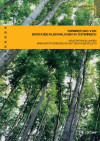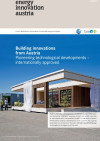Suchergebnisse für "Factsheet: Energietechnologien gestalten, die für alle sinnvoll und nutzbar sind"
IEA Bioenergy Task 33: Gasification of Biomass and Waste (Working Period 2019 - 2021)
The main aim of IEA Bioenergy Task 33 is the international as well as national information exchange and networking on thermochemical gasification of biomass and waste. The focus is on exchange of information regarding R&D programmes in area of biomass and waste materials gasification, commercial facilities and the marketing chance for gasification facilities to identify and avoid technical and non-technical hurdles.
IEA FBC Implementing Agreement Fluidized Bed Conversion (working period 2009 - 2013)
Overview of the current status of the fluidized bed technology worldwide in regards to energy technology.
IEA PVPS Task 12: Photovoltaics (PV) Sustainability Activities (working period 2024 - 2027)
Photovoltaics (PV) is a renewable energy source that is an important technology for the energy transition. For this reason, or rather despite this, it is important to consider sustainability aspects in PV as well. End-of-life solutions in particular play an important role, as a strong increase in the number of end-of-life modules is expected in the coming years. Well-functioning recycling methods, repair possibilities or reuse options are of great importance. In this project, these existing methods and capacities in Austria are being researched and published in reports and workshops.
Workshop: CO2 Capture and Sequestration (CCS) in Future International R & D Programmes
17. Nov 2004
WKO - Wirtschaftskammer Österreich, Rudolf Sallinger SaalVienna, AT
Initiation of a discussion process concerning the role of CCS in future RTD programmes in general and the presentation of realised (and/or planned) projects in particular as well as challenges of the deployment of CCS technologies.
Innovative system for decentralized CHP on basis of biomass gasification with process optimized production of a low-tar producer gas
Tar loads in the producer gas of CHP-plants based on biomass gasification are reduced by primary measures (staged gasification), whereby the possibilities for application are increased.
Gas cleaning for low tar producer gases from staged biomass gasification
Investigation on gas cooling, on heat management in staged gasification systems, and on gas cleaning from inorganic pollutants, like ammonia and aerosols, of the low-tar producer gas in decentralized staged biomass gasification.
Vilipa - Visible light based Person and Group Detection in existing buildings
Evaluation of the technical and economic feasibility of an occupancy detection system based on the technology of visible light sensing, which, in combination with the building management system, should reduce the energy consumption of buildings. The goal is to implement low-tech/low-complexity solutions that can distinguish between individuals and groups based solely on the detection of visible light reflections.
Best-of "Building of Tomorrow" 2010
22. and 23. November 2010
Skylounge, Austrian Chamber of Commerce (WKO)
Vienna, AT
In the frame of this conference results and ongoing activities of the research programme "Building of Tomorrow" are going to be presented.
Development of modular parts for clay-passive houses

Development of extensive storey-high modular parts made of renewable primary products (wood, straw, hemp) for clay-passive houses.
ESSBAR – Edible balcony gardens for retrofit – Vertical Greening Technologies for the City
Demonstration of an affordable, resource-saving and innovative balcony system with integrated edible vertical gardens and rainwater management. Considering the needs of residents for green outdoor spaces and the active participation of residents are an important part of the project.
OPENing Re-Use – Optimal planning decisions in the re-use sector
In an operational context, companies in the circular economy are faced daily with the question of whether a used product should be repaired, remanufactured, refurbished or recycled. The decision on what to do with used products is fraught with a great deal of uncertainty and must be made on a case-by-case basis - product-individually and depending on factors such as brand, condition, age, demand or recycling possibilities. As part of the "OPENing Re-Use" project, a business planning tool is being developed to support companies in their re-use planning, thereby increasing the efficiency of re-use processes and making re-use activities even more competitive with the purchase of new products.
Supply Chain Forest-Logistic-Saw as First application of platform of IT/Telematics concepts for resource efficient forestry use in montane forest
A Supply Chain Management concept for sustained use of the mountain forest in collaboration with all the individual participants is to be drawn up. Harvesting and transport from the forest to the mill will be registered and controlled by WEB-GIS technology. A CO2 balance sheet will be prepared and optimization potentials shown in the process. An outline will be made of an integrated job model.
PersonAI - User-Centered AI-based energy services built on personal preference models
Conduct a large-scale, long-term study with 40-50 people to create personal comfort profiles to increase comfort in buildings. The personal comfort profiles will then be fed back into the building control system as input variables in a proof-of-concept.
Verbreitung Von Biomasse Kleinanlagen In Österreich

Neue Entwicklungen Brennstoffversorgung mit Biomasse-Pellets
Forschungsforum
3/1998
Herausgeber: BMVIT
Deutsch, 6 Seiten
Downloads zur Publikation
ProKlim+ - Use of Model Predictive Control to optimize solar power consumption in case of increased energy efficiency.
Using weather forecast for building automation can help improving the energy efficiency of buildings and, thus, saving energy. In the project ProKlim+ the forecast of solar radiation will be used to optimize the building automation to satisfy the needs of the building users, and at the same time to minimize the energy demand on the one hand and to maximize the consumption of self-produced energy on the other hand.
Building innovations from Austria

Pioneering technological developments – internationally approved
energy innovation austria
1/2017
Herausgeber: BMVIT und Klima- und Energiefonds
Englisch, 8 Seiten
Downloads zur Publikation
INN'FIT4UM - Innsbruck "Fit4UrbanMission" - climate neutral Innsbruck 2030
Cities are the place where decarbonization strategies for energy, transport and buildings intersect. A few years ago, the municipality of Innsbruck set up a Smart City Group consisting of staff from the municipality, IIG, IKB and IVB to address this challenge. The goal of INN'F4UM is to develop a step-by-step plan to achieve climate neutrality for the city by 2030, building on an up-to-date representation of energy and resource flows together with the University of Innsbruck.
Know-How-Plus - Options and constraints of building renovation towards plus energy building standard
Aim of this research project is to identify the realizable reduction potential of energy consumption and CO2 emissions by refurbishment of the Austrian building stock towards plus energy building standard. Furthermore a construction-oriented manual will be supplied for interdisciplinary planning.
Solar Adsorption cooling system of residential and office buildings (SunSorber)

In the on hand project an adsorber/desorber for a solar operated/district heating operated one-level adsorption chiller with water as cooling agent and silica gel as adsorbent agent will be planned for a low range of performance (2 to 50 kW refrigerating capacity). It will be implemented as a test-/pilot plant. Hence these two substances are an alternative to the HFCKW´s cooling agents that are used nowadays.
Innovative regulation of thermal solar collectors
Research and development of the possibility of a "sensorless" regulation for thermal solar systems
